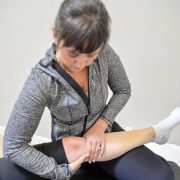When Your Knee Problem Isn’t Really a Knee Problem…
Knee pain is one of the most common complaints that brings people to physical therapy. Since most of our clients are in their 40’s, 50’s, and 60’s, many of them fear that knee problems could bring an end to their active lifestyles. But that doesn’t have to be the case!
Ironically, the truth about knee problems is that they’re often not actually knee problems!
There are many folks out there who struggle with chronic pain, instability, and stiffness in their knees. Naturally, they wonder why after countless treatments — sometimes even surgery — their knees still hurt. Even worse, they start to accept having “bad knees” as a way of life. But if treating the knee directly has been consistently ineffective, it’s time to look elsewhere. Sometimes, even though you may experience pain in your knees, the root of the problem is elsewhere.
Let me explain…
With most knee pain, we can trace the underlying issues to a locality directly below the knee (the ankle or foot) or directly above it (the pelvis, hips, core, and low back). If you don’t engage your core throughout your daily movement, it actually puts a huge amount of strain on your knees. As your legs swing and rotate, the torque that should be occurring through your pelvis and hips gets overloaded onto your knees. So as we age, we may start feeling a sense of wear and tear or weakness in our knees that actually comes from a lifetime of improper movement.
The mainstream medical model is focused largely on treating symptoms rather than identifying the root cause of WHY the problem is occuring in the first place. Pain pills, injections, and even surgery are often recommended before more conservative and natural treatments! And because these quick fixes are merely addressing the symptoms, the physical problems return for the majority of affected individuals. That’s because those knee issues actually stemmed from a different part of the body, and the knee will continue to be overloaded until those biomechanical problems are addressed directly!
So how do you I figure out what’s causing my knee pain?
Physical therapists go through extensive training in order to analyze your strength, mobility, and body mechanics. These factors allow them to figure out exactly what deficits are contributing to your knee pain, and develop a plan to optimize your movement patterns.
The purpose of a physical therapist is to train you in correct, healthy movement that both relieves your body of pain in the short term and protects it from further damage in the long term.
Poor balance is a common symptom of a weak core, and being off balance in your movement is bound to affect crucial joints such as your knees — especially in simple everyday activities like climbing stairs and walking. That’s one of the many reasons why we like to combine physical therapy with Pilates in our practice. Pilates-based rehabilitation is a unique, core-centric approach to teaching healthy movement patterns. We love seeing our clients become stronger, balanced, and pain free as they are able to combine the full body workout of Pilates with the practiced eyes of a physical therapist who can identify movement problems and guide the client through correcting them.
The fact is, knee problems are rarely just knee problems, and if you have chronic knee pain, it’s worth asking a physical therapist to help out! If you want more accessible information about knee pain, check out our Facebook Happy Hour video right here! Then you can even request a free discovery session with us to see what PT is all about, and how we can work together to create a customized plan of action for your individual needs. We’d love to hear from you!



